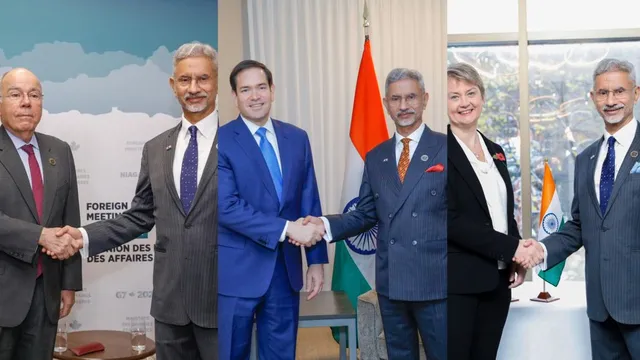- By Supratik Das
- Wed, 12 Nov 2025 09:39 PM (IST)
- Source:JND
External Affairs Minister S. Jaishankar on Wednesday held a series of bilateral meetings on the sidelines of the G7 Foreign Ministers’ Meeting in Niagara, Canada, including a key discussion with US Secretary of State Marco Rubio. The talks centered on strengthening India–US ties, enhancing global cooperation, and addressing pressing geopolitical challenges.
In a post on X (formerly Twitter), Jaishankar wrote, “Good to meet @SecRubio this morning at #G7 FMM. Appreciate his condolences on the loss of lives in the blast in Delhi.” He said that both sides discussed ways to deepen economic and strategic cooperation, particularly in trade, technology, and supply chains. “We also exchanged views on the Ukraine conflict, the Middle East/West Asia situation, and the Indo-Pacific,” the minister added.
The diplomatic outreach comes days after US President Donald Trump said Washington and New Delhi were “very close” to finalizing a new trade agreement.
Good to meet @SecRubio this morning at #G7 FMM.
— Dr. S. Jaishankar (@DrSJaishankar) November 12, 2025
Appreciate his condolences on the loss of lives in the blast in Delhi.
Discussed our bilateral ties, focusing on trade and supply chains. Exchanged views on the Ukraine conflict, the Middle East/West Asia situation and… pic.twitter.com/W4ps4E7D4L
India’s Proactive Diplomacy At G7
India participated in the G7 Foreign Ministers’ Meeting as an invited partner under Canada’s presidency, joining countries such as Brazil, Australia, and South Korea. The two-day event focuses on global security, economic resilience, energy collaboration, and strengthening partnerships across the Indo-Pacific region.
The Ministry of External Affairs said Jaishankar’s visit underscores India’s “continued commitment” to working with global partners in addressing common challenges. “EAM’s participation in the G7 reflects India’s resolve to bolster the voice of the Global South and contribute constructively to shaping global discourse,” the MEA said in a statement.
Talks With Canada, France, UK, And others
On Tuesday, Jaishankar met Canadian Foreign Minister Anita Anand and discussed progress on the Canada–India Joint Roadmap, focusing on cooperation in energy, trade, and people-to-people ties. Minister Anand expressed her condolences for the victims of the recent Delhi blast and reiterated that Canada “stands with the people of India during this tragic time.”
Delighted to meet with FM @AnitaAnandMP of Canada today.
— Dr. S. Jaishankar (@DrSJaishankar) November 12, 2025
Congratulated her on hosting the #G7 Foreign Ministers’ Meeting.
Appreciated the progress in implementation of the New Roadmap 2025. Look forward to the further rebuilding of our bilateral partnership.
🇮🇳 🇨🇦 pic.twitter.com/lQvLrU3UNo
She also acknowledged India’s growing influence at global forums, calling the partnership “vital” given India’s economic strength and 75 years of diplomatic relations.
Jaishankar’s schedule also included meetings with his counterparts from France, the United Kingdom, Brazil, Mexico, Germany, and South Africa. With UK Foreign Secretary Yvette Cooper, Jaishankar reviewed the India–UK Vision 2035 roadmap, highlighting the positive momentum in bilateral cooperation.
A pleasure to meet FM Dr Juan Ramón de la Fuente of Mexico.
— Dr. S. Jaishankar (@DrSJaishankar) November 12, 2025
Discussed further advancing our cooperation across business, trade, health & pharmaceuticals, and science & technology.
🇮🇳 🇲🇽 pic.twitter.com/vGVRze3U5y
His talks with French Foreign Minister Jean-Noël Barrot revolved around advancing the Strategic Partnership and exploring collaboration in multilateral forums. Meetings with Brazilian and Mexican foreign ministers focused on trade, technology, and health cooperation, underscoring growing South–South engagement.
Officials said Jaishankar’s extensive engagements at the G7 reflect India’s proactive diplomacy and its increasing role in global decision-making. His discussions covered a wide spectrum of issues, from trade and technology to regional stability, reaffirming India’s position as a bridge between the developed world and the Global South.

